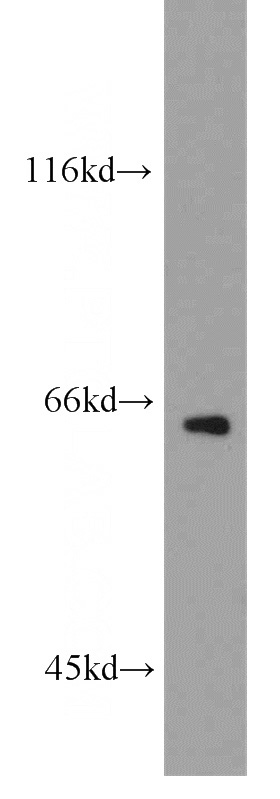-
Product Name
GPAA1 antibody
- Documents
-
Description
GPAA1 Rabbit Polyclonal antibody. Positive WB detected in HepG2 cells, mouse brain tissue. Observed molecular weight by Western-blot: 60-68 kDa
-
Tested applications
ELISA, WB
-
Species reactivity
Human,Mouse,Rat; other species not tested.
-
Alternative names
GAA1 antibody; GAA1 protein homolog antibody; GPAA1 antibody; hGAA1 antibody
-
Isotype
Rabbit IgG
-
Preparation
This antibody was obtained by immunization of GPAA1 recombinant protein (Accession Number: NM_003801). Purification method: Antigen affinity purified.
-
Clonality
Polyclonal
-
Formulation
PBS with 0.1% sodium azide and 50% glycerol pH 7.3.
-
Storage instructions
Store at -20℃. DO NOT ALIQUOT
-
Applications
Recommended Dilution:
WB: 1:200-1:1000
-
Validations

HepG2 cells were subjected to SDS PAGE followed by western blot with Catalog No:111056(GPAA1 antibody) at dilution of 1:400
-
Background
GPAA1(Glycosylphosphatidylinositol anchor attachment 1 protein) is also named as GAA1. It is the most conspicuously hydrophobic of the known subunits of GPIT, and it may play a key role in substrate recognition. It is predicted to be a multispanning membrane protein of 67 kDa with seven transmembrane (TM) domains, a large lumenal domain between the first two TM segments, and a cytoplasmically oriented N terminus bearing a potential ER retrieval signal in the form of a diarginine motif(PMID:12052837). It has 2 isoforms produced by alternative splicing and the full length protein has 2 glycosylation sites. This antibody is specific to GPAA1.
-
References
- Nagpal JK, Dasgupta S, Jadallah S. Profiling the expression pattern of GPI transamidase complex subunits in human cancer. Modern pathology : an official journal of the United States and Canadian Academy of Pathology, Inc. 21(8):979-91. 2008.
Related Products / Services
Please note: All products are "FOR RESEARCH USE ONLY AND ARE NOT INTENDED FOR DIAGNOSTIC OR THERAPEUTIC USE"
